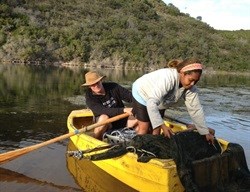
Top stories






More news


Marketing & Media
Ads are coming to AI. Does that really have to be such a bad thing?














The PhD courses in aquaculture and fisheries science will enhance the capacity of the continent to improve food security and the livelihoods of the people who depend on these industries.
The governments in this region have encouraged investments into the aquaculture sector, both at smallholder and commercial levels, in response to the general decline in capture fisheries in Sub-Saharan Africa.
Strengthening the links between the Higher Education Institutions (HEI) in the region and a sharing of teaching and research capacity, modern technologies and research into the demands of the fisheries and aquaculture sector are integral to increasing fish production and the sustainable management of resources.
The aquaculture sector needs technologically skilled human resources to guide it, but the region lacks a vibrant regional 'fit-for-purpose' training programme that holistically contributes to a lasting solution to this enduring food security challenge.
Growing regional capacity through training at PhD level in aquaculture and fisheries science is imperative to this cause. This is the incentive behind the concerted Fit-for-purpose PhD training in aquaculture and fisheries to improve food security and livelihoods in Sub-Saharan Africa. This project is one of a number of projects that form part of the Edulink II Program that is funded by the African, Caribbean and Pacific Group of States (ACP) - European Union (ACP-EU) Co-operation Programme in Higher Education.
The objectives of the project are to review the capacity and teaching facilities at the partner institutions, visit a lead aquaculture/fisheries science teaching institution in Africa and in Europe, develop PhD curricula in aquaculture and fisheries science, constitute an academic advisory board and to start implementing the curricula.
With a well-established and internationally recognised PhD programme, DIFS already has experiences that it can share with its partners, in addition to a model for the joint supervision of students that would allow the DIFS and South African Institute for Aquatic Biodiversity (SAIAB) staff to collaborate in capacity building and staff exchange programmes. With facilities such as the Rhodes and SAIAB libraries, good research facilities, the capacity in water research offered broadly at Rhodes, access to the staff training services offered by the Centre for Higher Education, Research, Teaching & Learning (CHERTL) and the experience of the Rhodes international office, the university has much to bring to the table.
DIFS believes the university is also going to benefit from the development of strong partnerships with these other African universities, which may in turn attract additional international students. The programme will also allow it to ensure that these international students have a good foundation from which to work and a working knowledge of the programme will allow them to design their own PhD and MSc curricula to cater for students with more diverse academic backgrounds.
"Our role at Rhodes is initially to assist and advise in developing the curricula with opportunities to possibly get involved in drafting them and possibly to form collaborative student supervisory teams with staff from the partner universities in time to come," said Dr Cliff Jones, a senior lecturer in the DIFS and project partner. "Ultimately, our own aquaculture and fisheries PhD/MSc curricula at Rhodes is likely to benefit from this project too - there is always room to improve and grow."
Edulink II is a programme funded by ACP-EU that aims to improve the standard of higher education in participating countries. The 'Fit for purpose PhD training programme in aquaculture and fisheries science', is one of a number of projects that form part of the programme.
The international partnerships developed through this programme will not only improve the supervision of PhD students by way of a review of the PhD curriculum, but will also allow for increased mobility of these students and staff who will have the flexibility of conducting research at any of the partner institutions. Target groups include PhD students, academic staff, fish farmers, regional partners and policy makers while target beneficiaries include fish farmers, academic staff and fish scientists.
The ACP-EU will contribute 85% of project costs (EUR 497,986.33). The partners (including Rhodes University) are jointly expected to contribute the balance of 15% (EUR 89,694.05).